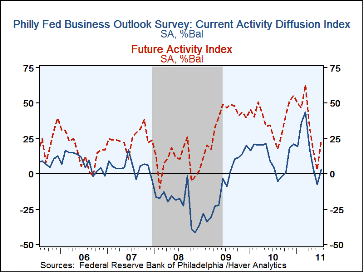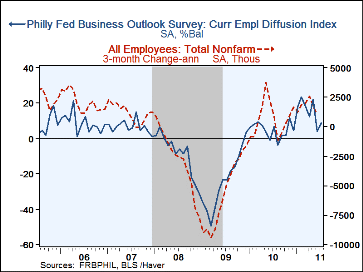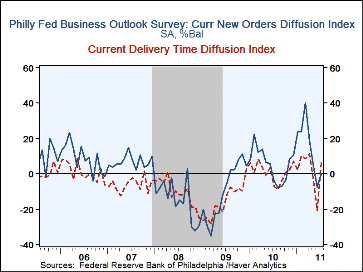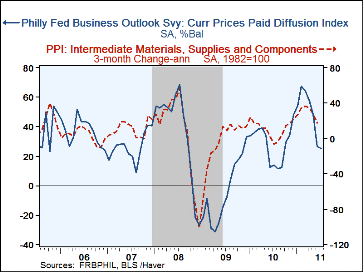 Global| Jul 21 2011
Global| Jul 21 2011Philadelphia Fed Business Activity Index Improves Marginally
by:Tom Moeller
|in:Economy in Brief
Summary
Like yesterday's Empire State Index, the Philadelphia Federal Reserve Bank's index of regional factory sector activity improved modestly, only the Philly number was positive while the Empire figure remained negative. The latest [...]
Like yesterday's Empire State Index, the Philadelphia Federal Reserve Bank's index of regional factory sector activity improved modestly, only the Philly number was positive while the Empire figure remained negative. The latest Philadelphia Fed General Activity index rose to 3.2 from an unrevised -7.7 in June. The figure roughly matched Consensus expectations for 4.0. During the last ten years, there has been a 72% correlation between the level of the Philadelphia Fed Business Conditions Index and the three-month growth in factory sector industrial production. There has been a 78% correlation with q/q growth in real GDP.
The m/m component improvements were delivery times (slower), new orders, inventories and employment. During the last ten years, there has been an 86% correlation between the employment index level and the monthly change in manufacturing sector payrolls. Yet to improve at all were shipments, unfilled orders, and prices paid. The prices paid index fell to its lowest level since September. Thirty-three percent of firms paid higher prices while 8% paid less. During the last ten years there has been a 72% correlation between the prices paid index and the three-month growth in the intermediate goods PPI.
The separate index of expected business conditions in six months improved to 23.7, its highest since April as expectations for all of the component series rose, including prices and capital expenditures.
The survey panel consists of 150 manufacturing companies in Federal Reserve District III (consisting of southeastern PA, southern NJ and Delaware.) The diffusion indexes represent the percentage of respondents indicating an increase minus the percentage indicating a decrease in activity. The figures from the Philadelphia Federal Reserve can be found in Haver's SURVEYS database. The Consensus expectations figure is available in AS1REPNA.
Expectations of Inflation: The Biasing Effect of Thoughts about Specific Prices from the Federal Reserve Bank of New York is available here.
| Philadelphia Fed (%) | Jul | Jun | May | Jul'10 | 2010 | 2009 | 2008 |
|---|---|---|---|---|---|---|---|
| General Activity Index | 3.2 | -7.7 | 3.9 | 4.2 | 12.1 | -7.7 | -21.5 |
| New Orders | 0.1 | -7.6 | 5.4 | -4.5 | 5.4 | -9.8 | -14.9 |
| Shipments | 4.3 | 4.0 | 6.5 | 3.0 | 8.2 | -8.1 | -9.2 |
| Unfilled Orders | -16.3 | -16.3 | -7.8 | -8.0 | -3.0 | -15.3 | -17.6 |
| Delivery Time | 6.4 | -20.5 | -2.3 | -7.3 | 0.9 | -15.3 | -10.6 |
| Inventories | 1.4 | -8.5 | -5.4 | 2.0 | -5.1 | -24.1 | -16.7 |
| Number of Employees | 8.9 | 4.1 | 22.1 | 6.6 | 4.6 | -24.0 | -8.8 |
| Prices Paid | 25.1 | 26.8 | 48.3 | 14.0 | 28.5 | -4.0 | 36.1 |
These diffusion indexes represent the percentage of respondents indicating an increase minus the percentage indicating a decrease.
Source: Federal Reserve Bank of Philadelphia
Tom Moeller
AuthorMore in Author Profile »Prior to joining Haver Analytics in 2000, Mr. Moeller worked as the Economist at Chancellor Capital Management from 1985 to 1999. There, he developed comprehensive economic forecasts and interpreted economic data for equity and fixed income portfolio managers. Also at Chancellor, Mr. Moeller worked as an equity analyst and was responsible for researching and rating companies in the economically sensitive automobile and housing industries for investment in Chancellor’s equity portfolio. Prior to joining Chancellor, Mr. Moeller was an Economist at Citibank from 1979 to 1984. He also analyzed pricing behavior in the metals industry for the Council on Wage and Price Stability in Washington, D.C. In 1999, Mr. Moeller received the award for most accurate forecast from the Forecasters' Club of New York. From 1990 to 1992 he was President of the New York Association for Business Economists. Mr. Moeller earned an M.B.A. in Finance from Fordham University, where he graduated in 1987. He holds a Bachelor of Arts in Economics from George Washington University.










